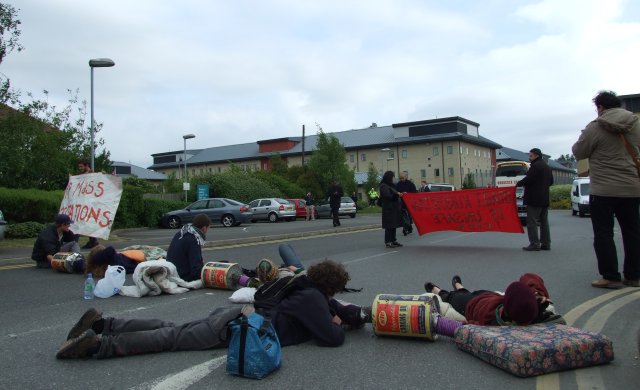Colnbrook blockaders' arrest 'was unlawful'
Stop Deportation | 22.10.2009 10:58 | Migration

soon after the start of the blockade
Sitting at the Uxbridge Magistrates Court, judge Jane Wright concluded that "the exclusive aim" of giving the order under Section 14 of the Public Order Act by the senior police officer present at the scene, Inspector Beattie, was "to facilitate the deportation of a number of people to Iraq without further ado."[2]
Rejecting police claims that the protest would have caused 'serious disruption to the life of the community' or that its purpose was 'to intimidate others', she said, "By any view it cannot be said that the purpose of the demonstration was to intimidate. Its clear purpose was to prevent the deportation of an individual and I do not find that Inspector Beattie believed, let alone reasonably believed, that the purpose of the protesters was to intimidate others with a view to compelling them not to do an act they had a right to do."[3]
Pronouncing her verdict, judge Wright said, "I have found that the only purpose of giving the order falls outside the considerations to which Inspector Beattie is entitled to have regard and it follows that the order was not lawful." "If the order isn't lawful," she added, "it isn't an offence not to comply with it and consequently I find all six of the defendants not guilty."[4]
The defendants' argument was that their action was "reasonable and proportionate" to the threat faced by deportees and that the defence of necessity should be open to them. The Crown Prosecution did not accept that their actions were reasonable and proportionate and argued that a "reasonable person would not have acted in such a fashion" and even "the reasonable direct action protester" would not have acted in the way the defendants did, in reference to using glass and concrete blocks. Inspector Beattie, however, said in court, whilst giving evidence, that he had found the defendants "well behaved, pleasant even."
-ends-
For any further information or questions, please contact:
stopdeportation[at]riseup.net
Notes:
[1] Six campaigners from the Stop Deportation Network had encased their arms in glass and plastic tubes attached to concrete barrels, blocking the entrance to Colnbrook detention centre in an attempt to stop the coaches carrying deportees to the airport from leaving the detention centre. The five-hour blockade ended with all six being arrested under Section 14 of the Public Order Act. As soon as the blockade was removed by the police cutting team, three WH Tours and Woodcock coaches were seen leaving the detention centre carrying about 45 deportees. For more details, see the group's press releases at
 http://stopdeportation.net/node/16 and
http://stopdeportation.net/node/16 and  http://stopdeportation.net/node/17. Photos and video are available at
http://stopdeportation.net/node/17. Photos and video are available at  http://www.indymedia.org.uk/en/2009/05/430420.html.
http://www.indymedia.org.uk/en/2009/05/430420.html. [2] The timing of the order coincided with a message on the police dispatch radio by the chief inspector in charge of the operation back at the police station to the effect that the detention centre was 'concerned' that the 'convoy' may be subject to some form of interference on route and that it was particularly important that the scheduled flight on which the 'prisoners' (they referred to detainees as prisoners) were to be returned must not be delayed.
[3] For an order to be given under Section 14 of the Public Order Act, the senior officer present at the scene must reasonably believe that it may result in serious public disorder, serious damage to property, or serious disruption to the life of the community, or that the purpose of the persons organising it is the intimidation of others with a view to compelling them not to do an act they have a right to do or to do an act they have a right not to do.
[4] Police initially charged the protesters with 'trespassory assembly' under Section 14B(2) and (6) of the Public Order Act 1986. However, the Act defines 'assembly' as an assembly of 20 or more persons, but the total number of protesters was no more than 15. So in July 2009, the police changed the charge to Section 14(5) and (9) of the Public Order Act, which make it an offence to take part in a 'public assembly' and knowingly fail to comply with a condition imposed by the senior police officer present at the scene.
Stop Deportation
 Homepage:
http://stopdeportation.net
Homepage:
http://stopdeportation.net
Comments
Display the following comment